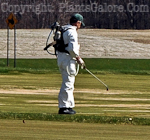When you are actually
applying the pesticide, it should be in a diluted
form inside the sprayer. However, this does not mean
that you can relax your safety consciousness at all.
This is a time when you may expose yourself, others
or the environment to a pesticide.
 First of all, wear
the proper protective gear. This usually means
rubber, chemical resistant gloves, solid, water
resistant footwear, long-sleeve shirt or coverall
and a hat.
First of all, wear
the proper protective gear. This usually means
rubber, chemical resistant gloves, solid, water
resistant footwear, long-sleeve shirt or coverall
and a hat.
Remember that
different parts of the body absorb things at
different rates. Head covering is important since
the scalp absorbs chemicals faster than the hands.
The genitals are also very absorbent so be sure to
thoroughly wash your hands before using the bathroom
after spraying.
Another general
factor to consider is the wind. It is usually best
to spray in the early morning or early evening when
the wind is low. A gusty wind will spread the
pesticide to non-target areas and is more likely to
spray it back onto you.
Finally, the best
approach is to mix only the amount of pesticide that
you will need for the job at hand. If there is any
leftover in the sprayer, apply it to the intended
target area and never pour it down any drain of any
type. This will only lead to a stream somewhere.



